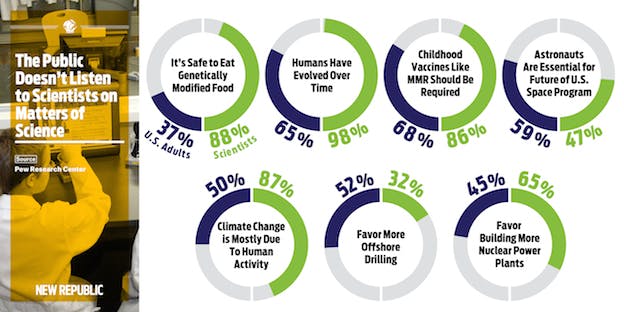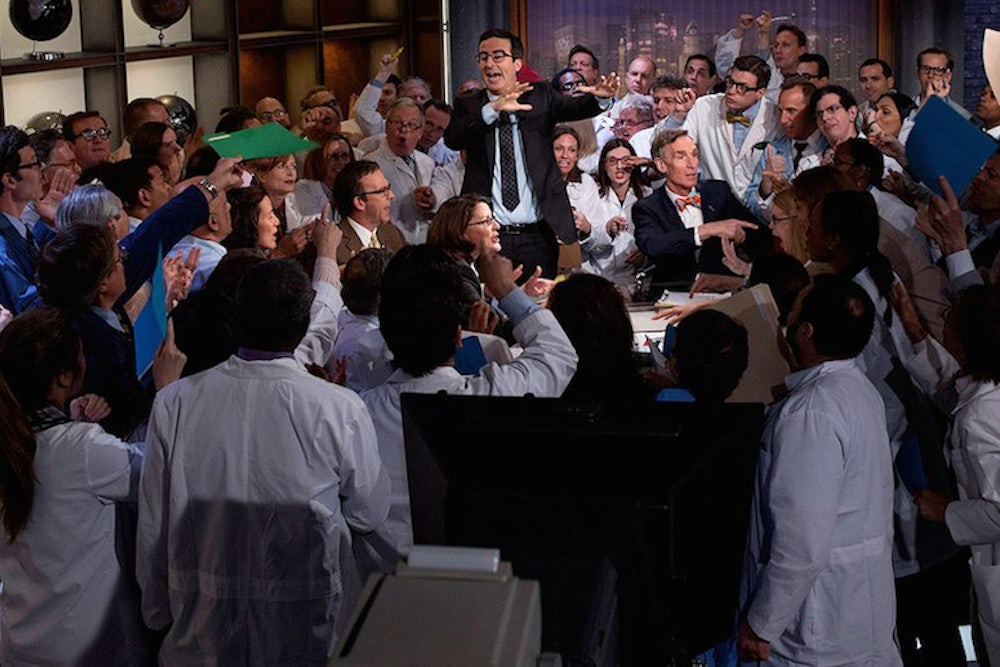Last May, comedian and late-night talk show host John Oliver tore apart media coverage of human-induced climate change on his show “Last Week Tonight,” bringing a statistical representation of scientists who do and don’t subscribe to the theory in for a debate. Three representatives for the skeptics and 97 scientists who represented the other side piled onto the stage.
“You don’t need people’s opinions on a fact,” Oliver said about pundits’ coverage of the public’s wary perception of climate change. “The debate on climate change should not be whether or not it exists, but what we should do about it.”
Just as Oliver’s critique of climate change coverage demonstrated a gap in opinion between the public and scientists, a recent study conducted by the Pew Research Center and the American Association for the Advancement of Science (AAAS) has found that there are also striking differences in perception between the general public and scientists on a range of other scientific topics, such as genetically modified foods, human evolution, vaccination, and offshore drilling.
“What we’re surprised by is both the size of those differences and the extent of those differences,” said Cary Funk, the lead author of the study and associate director of science research at Pew. Funk says the team tried to cover as broad an array of topics as possible in creating the study. “To see that pattern quite consistently was quite surprising,” she said.
The largest gap in opinion concerns genetically modified foods. Only 37 percent of the public view genetically modified foods as safe to eat; 88 percent of scientists consider them innocuous. Another large gap is in human evolution: 98 percent of scientists say they believe humans have evolved over time, but only 65 percent of the public agrees.

The study polled a random sample of 3,748 AAAS scientists based in the U.S. They came from a range of disciplines, including chemistry, medical sciences, earth sciences, social sciences, and astronomy.
Funk said it’s hard to pinpoint a single reason why there are such large gaps in perception between them and the public. However, a few in-depth questions from the study might provide clues. According to the survey, the public may have skewed versions of what scientists themselves believe. Thirty-seven percent of the public doesn’t think scientists generally agree on climate change, and a whopping 67 percent said they don’t believe that scientists clearly understand the health effects of genetically modified crops.
Funk said there’s no quantitative proof of distrust between the public and scientific community. “I sigh because it’s a question that comes up every so often,” she said. “[But] we don’t see broader evidence of that.”
One thing that experts and amateurs agree on is the lackluster quality of K-12 STEM education in America. In fact, the study found that 75 percent of scientists believe that poor STEM education in schools is a major factor in the public’s limited scientific knowledge.
According to the study, scientists view the discrepancies in public opinion on science as affecting all levels of society. A majority of scientists do not believe that the best science frequently guides clean water and air regulations, or food regulations. Only 58 percent of scientists find that the best science guides new drug and medical treatment regulation.
So what does this mean for the rest of us? Maybe that it’s time to get our facts straight. Even though the Pew study found that the public generally supports the sciences and federal funding for scientific research, there’s clearly more influencing our stances on key issues than unbiased fact.
“Science and the work of science is enmeshed in all aspects of society,” Funk said. “What we’re trying to do is bring information to the public, and what people do with it from there is up to them.”
